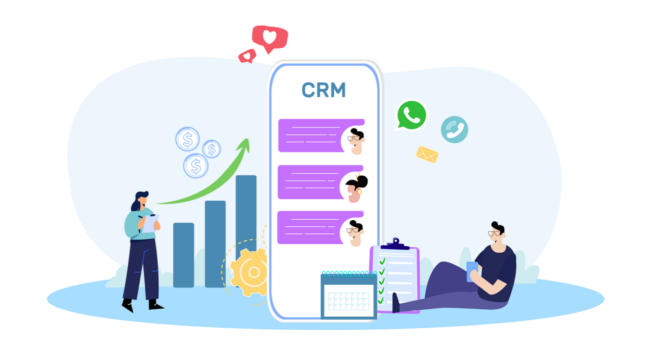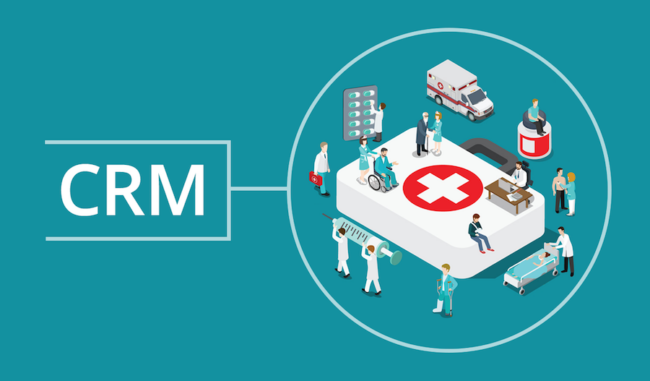Picture a journey that starts with a step and evolves into a dynamic dance. That’s the story of customer relationship management (CRM). It began as a basic tool for managing customer contacts and sales, similar to a digital address book. But it has since expanded into a vital cog in the machinery of modern business, promoting deep and meaningful customer engagement. This transformation was not sudden, but gradual and remarkable.
Emergence of CRM

CRM for business emerged as a technology-based solution aimed at managing a company’s interactions with its customers. Its original goal was to automate sales processes, simplifying the tracking of all kinds of interactions with customers, from sales calls to service inquiries. Businesses could understand their customers better, and that made it easier to build long-lasting relationships.
At the heart of CRM’s emergence was the need for businesses to move away from time-consuming manual processes to more automated and efficient ones. This shift was primarily driven by technological advancements, which enabled the storage, processing, and analysis of large amounts of data.
CRM as a Sales Management Tool
In its early stages, CRM was primarily used as a sales management tool. It kept all customer data in one place — from contact details to purchase history. But it didn’t stop there. CRM could track every single interaction with a customer, helping salespeople build relationships and close deals.
Then came the power of automation. CRM started doing the tedious tasks so that salespeople could focus on what they do best — selling. It took care of the admin work, leaving sales teams free to concentrate on building relationships with customers.
Data analysis was also essential. It provided insights into customer behavior and preferences, ensuring that businesses could customize their sales strategies accordingly.
CRM’s Transition to Customer Engagement

Over time, CRM has expanded beyond sales management, transitioning to a more comprehensive approach to customer engagement. This change was driven by the realization that building customer relationships required more than just efficient sales processes. It required businesses to engage with their customers at every touchpoint, providing personalized experiences based on their unique needs and preferences.
This transformation was driven by technology and the rise of the digital age. As businesses moved online, they needed a way to manage customer relationships in this new digital world. So, CRM started tracking online interactions, from website visits to social media comments. It helped businesses understand what their customers were saying about them online and respond in real time. This opened up a whole new level of customer engagement, one where businesses could connect with their customers on a deeper level.
Challenges and Future Trends
However, this evolution has not been without challenges.
- Businesses often encounter difficulties integrating these increasingly complex systems into their existing IT infrastructure.
- Furthermore, the increasing importance of data privacy and security presents another set of challenges that businesses must address.
- Data overload makes it challenging to filter out the noise and focus on what truly matters.
Despite these challenges, the future of CRM looks promising. It is expected to evolve with a focus on personalization and automation to better engage customers. Furthermore, technological advancements, such as AI and machine learning, will further enhance CRM’s capabilities, leading to even more personalized experiences for businesses.
The Role of Artificial Intelligence in CRM

Artificial Intelligence (AI) is changing how businesses use CRM. AI helps businesses make sense of massive amounts of data. It can predict customer behavior and even suggest next steps for the sales team. For example, AI can analyze past purchases and browsing habits to recommend products to customers. This helps sales teams offer more personalized service. AI can also automate routine tasks like sorting emails or setting reminders, making CRM more efficient.
CRM in Small Businesses vs. Large Corporations
CRM is not just for big companies. Small businesses also benefit from it. For large corporations, CRM helps manage complex operations and multiple teams. It often integrates with other software to give a full view of the customer. Small businesses may not need all these features but can still use CRM for basic tasks. This includes tracking customer interactions and managing sales pipelines. In both cases, the goal is the same: to build better relationships with customers.
Importance of Mobile CRM

Today, many people do business on their phones. Mobile CRM lets sales teams access customer data on the go. This means they can update information, schedule appointments, or respond to customer inquiries anytime, anywhere. Mobile CRM is not just a scaled-down version of a desktop system; it’s a tool designed for a fast-paced, mobile environment. Businesses that adapt to this trend are better positioned to engage their customers effectively.
Social Media and CRM Social media is a critical touchpoint for customer engagement. CRM systems now integrate with social media platforms. This means businesses can track customer interactions across multiple channels. This is crucial for brand management and customer service. For instance, if a customer complains on Twitter, the CRM system can alert the customer service team to respond immediately.
Data Security and Compliance
As CRM systems store valuable customer data, security becomes a critical concern. Businesses must comply with regulations like the General Data Protection Regulation (GDPR) in Europe or the California Consumer Privacy Act (CCPA) in the U.S. This involves securing data and providing options for customers to control their information. Failing to meet these requirements can result in heavy fines and a loss of customer trust.
CRM in Healthcare

CRM is making inroads into sectors beyond retail and sales, such as healthcare. In healthcare, CRM helps manage patient records and appointments. It also enhances patient engagement by sending reminders for check-ups or medication. The goal is to provide better patient care, which, in turn, builds trust and loyalty. CRM in healthcare shows that this technology has a versatile role in managing relationships, not just with customers but also with patients.
Conclusion
CRM’s evolution from contact management to customer engagement reflects the changing dynamics of the business landscape. Today, businesses are increasingly recognizing the importance of building strong relationships with customers, and CRM will remain at the forefront of these efforts.
